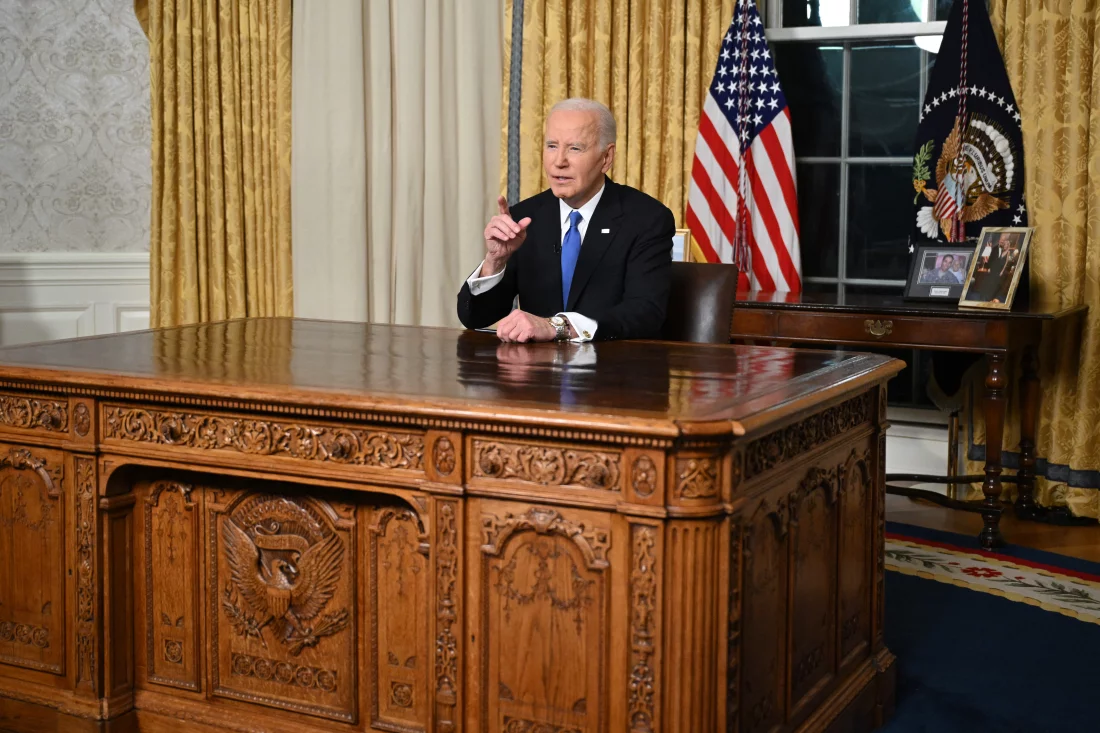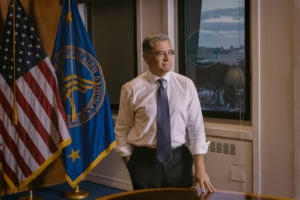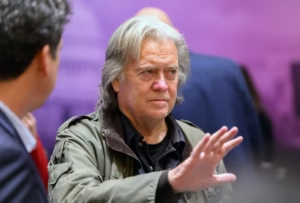From clemency to conservation, the outgoing president pushes to cement his legacy ahead of a successor determined to erase it.
By Jack Hogan | Jan 17, 2025 at 12:06 a.m. ET Updated | U.S. NEWS & Politics
He’s designated national monuments in California and removed Cuba from the list of state sponsors of terrorism. He’s blocked a Japanese company’s takeover of U.S. Steel and extended temporary protected status to nearly 1 million immigrants. He’s commuted the sentences of nearly everyone who was on federal death row, and he’s granted to his son Hunter a sweeping pardon.
President Joe Biden is ending his time in office as he began, with a burst of executive actions meant to differentiate him from the man who preceded him and will succeed him: President-elect Donald Trump.
Biden’s actions have been far-reaching, touching nearly every area of government, and are likely to continue up until his final hours in office, according to administration officials. Even as many at the White House were packing up their offices — planning to vacate at the end of the day on Friday — there were still last-minute preparations for additional executive actions.
The president has been weighing action aimed at advancing the Equal Rights Amendment, which would prohibit discrimination based on sex, according to people familiar with the discussions, speaking on the condition of anonymity to disclose internal plans. And Biden has been considering issuing preemptive pardons for figures who might face the hostility of the incoming Trump administration.
Outgoing presidents often conclude their tenure with a flurry of activity, such as pardons or proclamations, but Biden’s efforts have been unusually wide-ranging, reflecting his conviction that Trump represents a unique threat to American traditions.
In recent days, Biden’s administration has canceled student loans for 150,000 borrowers and approved unprecedented new export controls on computer chips and other technology crucial to advanced artificial intelligence projects.
The Food and Drug Administration has moved to require labels on the front of food and drink packages in a bid to encourage Americans to make healthier decisions. The Biden administration on Wednesday also released a proposal to dramatically reduce nicotine levels in cigarettes.
Many of the actions taken in recent days are the result of months of planning. The preparation began when Biden dropped out of the reelection race in July, and it has accelerated since it became clear on Nov. 5 that he would be handing power to Trump rather than Vice President Kamala Harris.
When Biden convened his Cabinet in September, he urged department heads to take actions that would burnish his legacy, while preventing a potential future Trump administration from chipping away at it.
“This Cabinet meeting comes at a time when we have four months left in the administration,” he said that day. “And we’re going to keep running through the tape, because the vice president and I are determined to keep making sure that the democracy delivers what the American people are asking for and what we provided.”
He added, “That means continuing to implement the historic laws we’ve passed. They’ve allowed us to invest in America, rebuild our infrastructure and implement our historic laws.”
In another little-noticed example, the incoming Trump administration will find what may be an unwelcome surprise Tuesday, when a new rule becomes legally effective, giving a 12 percent pay raise to about 14,500 blue-collar employees who serve at three Army depots and some Veterans Affairs facilities. The raise, authorized by the Office of Personnel Management in October, will appear as a final rule in the Federal Register on Jan. 21, meaning the incoming Trump administration will have to pay for it, at a cost of $150 million a year.
The move comes as Trump and his allies have vowed to cut trillions of dollars from the federal budget and shrink the workforce. Biden officials overcame long-standing opposition from officials in Democratic and Republican administrations going back to the Obama era to raising the salaries of these workers, because of the cost.
Another focus for Biden administration officials has been to spend money already allocated by Congress, issuing grants for projects before the Trump administration could attempt to claw the money back or leave it unspent.
The administration also has launched proposed regulations on a path that could make it harder for Trump to derail them. Still, the new Congress, controlled by Republicans, could use the Congressional Review Act, which allows Congress to disapprove new federal rules for up to 60 days.
More than 1,300 climate, education, health-care and labor regulations could be subject to this review, according to an analysis by the Regulatory Studies Center at George Washington University. The Biden administration took a series of regulatory actions in April, outside that window, to ensure that the regulations would take hold.
There was a drop-off in such actions during the fall, but the activity ramped up again in December after the election.
It is not clear how much energy and attention the Trump administration will want to spend on finding, scrutinizing and overturning Biden’s regulations. Trump is likely to be focused early in his term on addressing his high-profile promises, such as mass deportations and sweeping tariffs.
“One of the advantages that the president has is they can move first,” said Andrew Rudalevige, a professor at Bowdoin College who has studied executive actions. “They can create a new status quo, and in Washington, the status quo is privileged. Inaction is always going to be the winner in D.C. over action.”
He added, “And to the degree you can reset the agenda somehow, it’s appealing to presidents when they’re going out the door.”
The incoming president cannot rescind the clemency that Biden has granted to most federal death row inmates or pardons that he has granted to other prisoners. And he would probably face legal challenges if he were to attempt to revoke the temporary protections granted to immigrants from El Salvador, Venezuela and elsewhere.
Beyond that, Biden’s administration sought to deploy numerous rules earlier in his term, on everything from workplace protections to medical privacy, ensuring they would be well-established by the time the new administration arrives.
“It does strike me as reasonable to get your preference into place and make them as difficult as possible to overturn,” Rudalevige said. “A lot of this unilateral action is fragile, so it makes it limited to what you can do.”
But other actions have been taken more recently. Biden, for example, on Jan. 6 banned new offshore oil and gas drilling in most U.S. coastal waters, part of a goal to conserve at least 30 percent of U.S. lands and waters by 2030. The White House boasted that Biden had conserved more than 670 million acres of land and water, more than any president in history.
But Trump immediately protested the move and vowed that it would be undone.
“President Biden’s actions yesterday on offshore drilling, banning offshore drilling will not stand,” he said. “I will reverse it immediately. It’ll be done immediately and we will drill, baby, drill.”
Many other actions also could be quickly undone or undermined by Trump.
“Joe Biden’s legacy is marred by crippling inflation, a migrant crime invasion, and American weakness on the world stage,” Anna Kelly, a Trump-Vance transition spokeswoman, said in a statement. “Thankfully, in just five days, President Trump will usher in a new Golden Age of American Success and carry out his mandate to Make America Wealthy, Safe, and Great Again.”
Still other actions come in the rare areas in which Biden and Trump share common ground. Biden, for example, earlier this month blocked the sale of U.S. Steel to a Japanese rival, declaring Nippon Steel’s $14.9 billion bid for the U.S. steelmaker “prohibited.”
Trump had previously opposed the takeover, writing on his Truth Social platform, “As President, I will block this deal from happening. Buyer Beware!!!”
Like other presidents, Biden has sought to cement his foreign policy preferences in his closing days. With assistance from Trump’s envoys, Biden helped secure a tentative ceasefire in the Middle East. He has approved Ukraine’s use of long-range missiles to strike Russian targets, and he has imposed new sanctions on Russia’s energy sector.
Biden has gone further with his executive actions than most of his immediate predecessors, scholars said — issuing more commutations and pardons, reserving more land, implementing more regulations.
But Alexander Tippett, co-author of “The Peaceful Transfer of Power: An Oral History of America’s Presidential Transitions,” said Biden is not going wildly outside the usual norms.
“I would characterize the Biden team’s late actions as an aggressive effort to cement his policy agenda and legacy, but one that is largely in line with modern precedent,” Tippett said.
President Barack Obama also sought to cement his legacy between Election Day 2016 and Inauguration Day 2017, as the first Trump presidency loomed.
Obama pushed to enroll more people in health insurance under the Affordable Care Act, for example, and banned drilling in parts of the Arctic and Atlantic Ocean. Like Biden, he named two national monuments, the Bears Ears area in Utah and the Golden Butte area in Nevada.
But in a sign of how fragile such moves can be, Trump later scaled back the Bears Ears monument, along with another Utah monument, Grand Staircase-Escalante.
Biden had signed 157 executive orders as of Wednesday, according a tally from the American Presidency Project, more than Obama did in either of his four-year terms. That is also more than George W. Bush signed in his second term, ahead of transferring power to Obama.
Trump, however, signed 220 executive orders in his first term, more than any president in four years since Jimmy Carter.
Biden’s final days in office are in some ways a mirror image of his first days. When he took office, he signed a number of executive actions that undid Trump’s policies and charted a new course for the federal government.
The day he took office, Biden returned the United States to the Paris climate accords, repealed the ban on U.S. entry for citizens of some majority-Muslim countries, signed an order extending nationwide restrictions on evictions and foreclosures and, amid the coronavirus pandemic, implemented a mask mandate on federal property.
When Trump takes office on Monday, he is likely to once again reverse some of those actions — and many more.












Be First to Comment